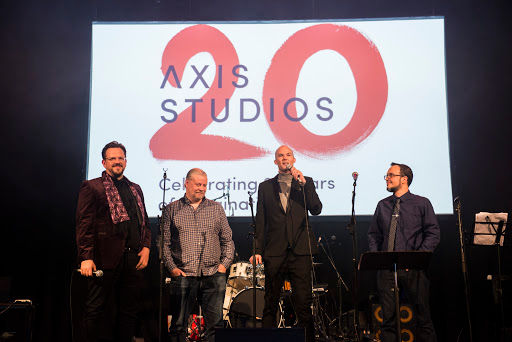Axis Studios Talk- Interns/ advice 2019
- CG WORLD

- Feb 23, 2020
- 4 min read
Updated: Mar 2, 2020
Glasgow- main site -165 employees/200 (looking to expand within a year) London- 20/30 employees (soon to be 70) Bristol- 55/70

Depending on local students applying due to Brexit. want to focus more on tv series/ feature length films. socialising is very important to the Axis ‘Family’. main programs used: Nuke, Redshift, Maya, Photoshop, Houdini- (very important for modellers) Work closely with Aardman animation worked on ‘Helping Hand’- form Love Death and Robots personal; you don’t need to be ultra-confident as long as you are friendly. your work isn’t expected to be professional, as long as you immerse yourself in the work and with your co-workers, trying the best you can. 7 open briefs (summer) -storyboarding and animatics -concept design -modelling and texturing -Rigging and deformation -character animation -lighting, rendering and compositing -FX rendering compositing ‘own the brief, be the best’ those accepted to the mentorship will get 1 to 1 every week on site guidance and feedback with a project of your choice
Always get loads of animators applying, a lot of people applying for 3d environment artists this year, looking more for riggers and Fx artists. generalists are good but best to apply more time to a specific area for profession. can change speciality down the line on the job providing you teach yourself the basics.
Yi Xuan Zhou- ex-mentee student working at axis

Environment Artist summer application: https://www.artstation.com/artwork/nl5WO year mentor project: https://www.artstation.com/artwork/3J9vA
-works on any modelling aside from characters/ vfx models -can also work on lighting and composition -used Redshift for his work as it is the fastest, high quality Ray based rendering software (pirated it) -summer brief was really loose, basically to take a shot from a film and re-make it to the best quality possible. Craig Russell FX- ex-mentee student working at axis
Understand getting a job can be hard, but if you put yourself out there and do this mentorship/ internships you have a better chance.
-research jobs first, which ones are more popular and which are ones that need filling and does it suit you?
-“don’t be a d**k”
-don’t drop out
-good to have a few months of Houdini experience
-be enthusiastic, have a good attitude to learn, as you will always be learning in this job.
-sometimes you have to take a gamble.
-show keys aspects of potential in your portfolio
-honours project- procedural rigging then worked more in Houdini.
-choose a shot from a film you really like and try replicate it for VFX work, don’t spend too much time on modelling and focus as much time on perfecting the fx.
-find techniques as solutions to speed up your process of working
-Axis pipeline is all based around Houdini
-scattering/ shading is particularly something to get around in Houdini and is important to learn.
Angus Dunn - ex-mentee student working at axis
Animator- https://www.artstation.com/angusfordays
-if you don’t manage to get the mentorship, defiantly apply for an internship/ work experience -get to work with motion capture and clean up -a variety of body mechanics are good to have on a portfolio, also a variety of styles like cartoony/ realistic as in job your style will change with each project.
Hamish Mitchel
Character modeller- ex-mentee student working at axis
Summer project: https://www.artstation.com/artwork/rngoe
(Self-portrait)
-Always pose your character models for portfolio, give it character
-always ask questions, especially about efficiency and quality
-10-6 usual start working hours
-pipeline for head:
photogrammetry test (fail)
take photos for reference (even lighting not highlights/ shadows)
artstation ref to set a benchmark
Zbrush on top of photogrammetry
retopologies in Maya
texture in Mari, as it lets you split objects into different uv sets
Xgen for hair and render with Arnold AI standard shader and simple 3 point lighting
-Axis are using custom tools in Houdini for hair/ many others for it to fit in their production pipeline -are looking for character artists to be able to groom -you get a concept to work from, -Collab with onsite and onsite artists on the same character, no one works on a character from start to finish -take your work seriously, don’t slack or you’ll fall behind the people working hard, who’ll end up getting the job instead of you. -show up and do the work to your best standard, be open to criticism, put in the time. work on lots of little character projects and be critical with your own work as if looking at it from someone else’s eyes, as being precious with your work can hold you back. -practice, do something everyday -work to the big picture -use reference for quality/ lighting to aim for. -your employers will understand you aren’t going to be a professional from the start, mistakes are ok, its how you handle it and work around it -you can contact the people from todays talk for advice with your work -development is just as important as the final piece, especially with concept art, the more development, the more impressive it is. -initially use skype for contacting students -looking for people to do work experience usually 3-4 months as they are really busy at the moment. -mentorships tend to start in October. Hope this helps.




Comments